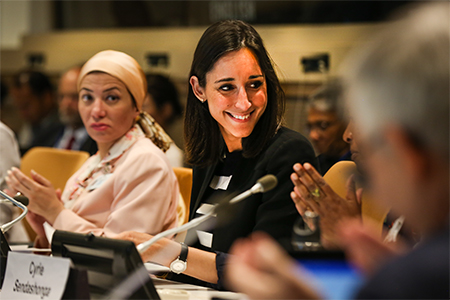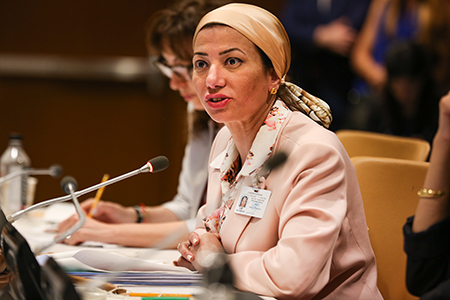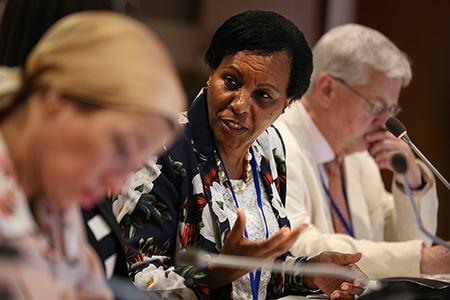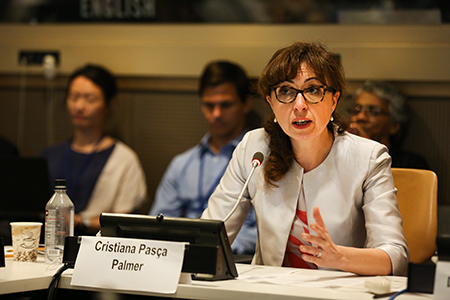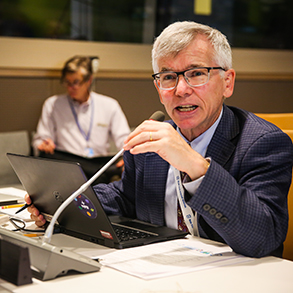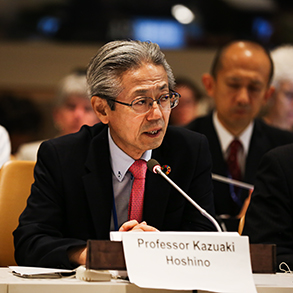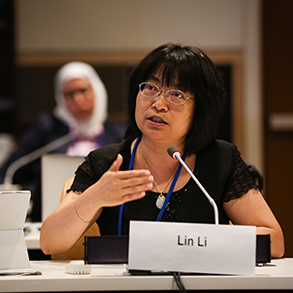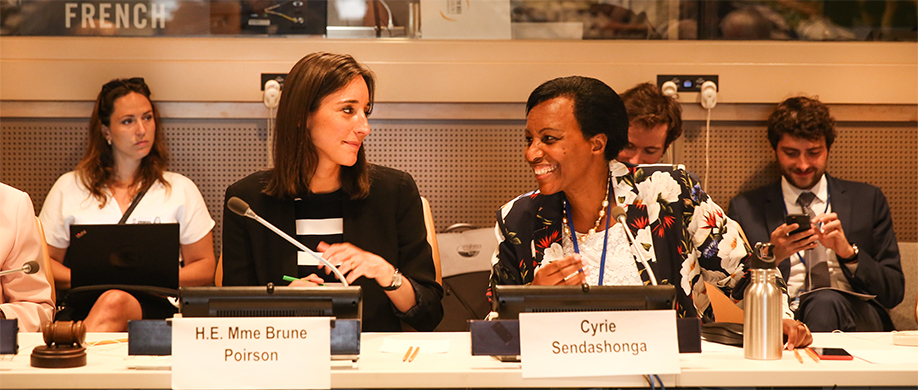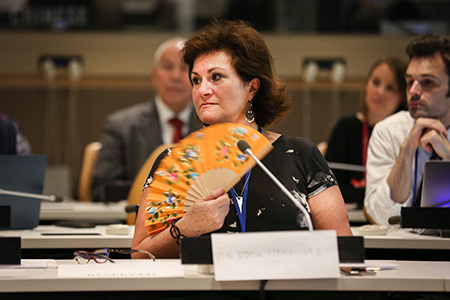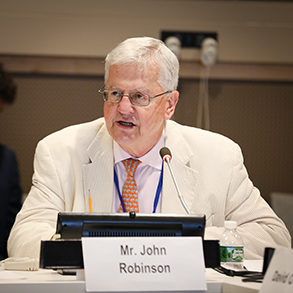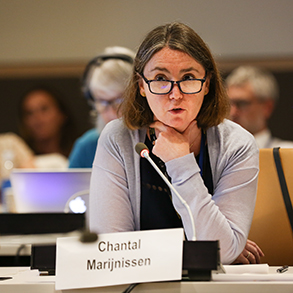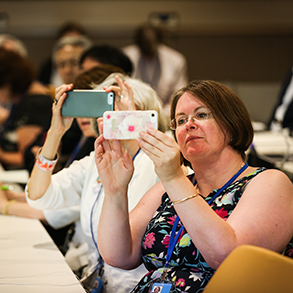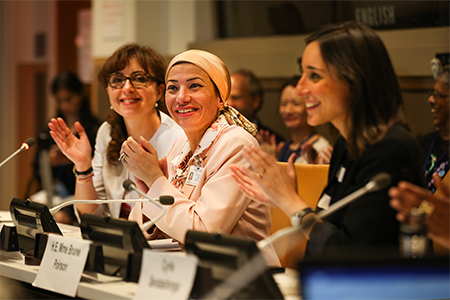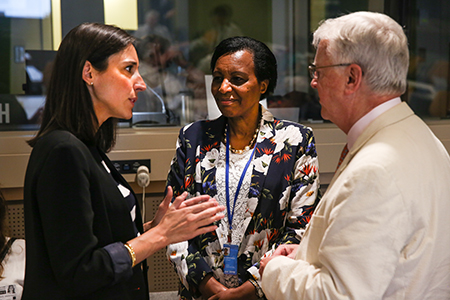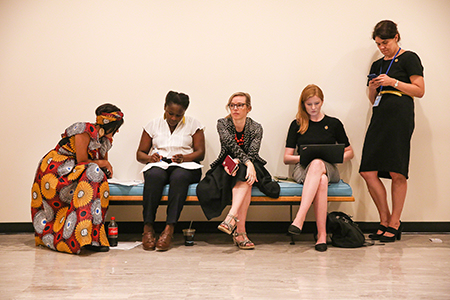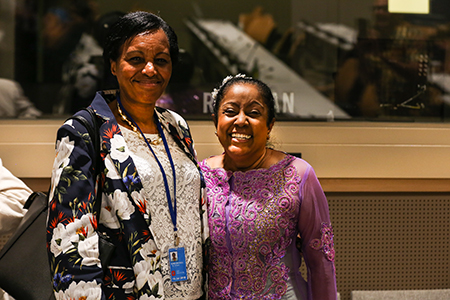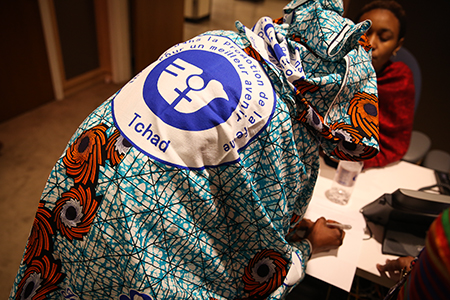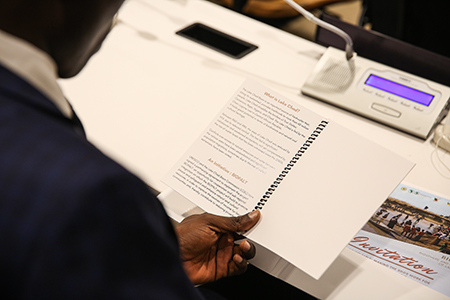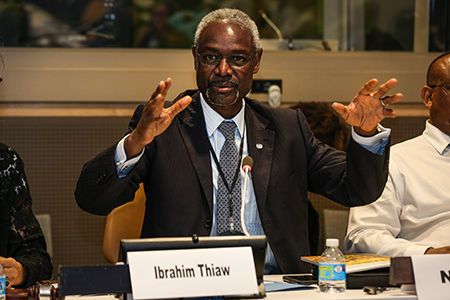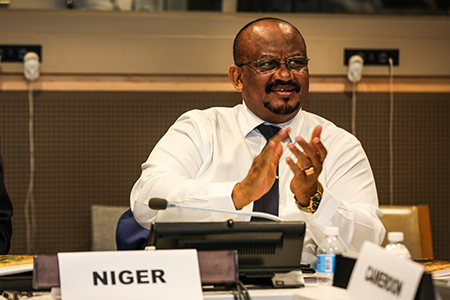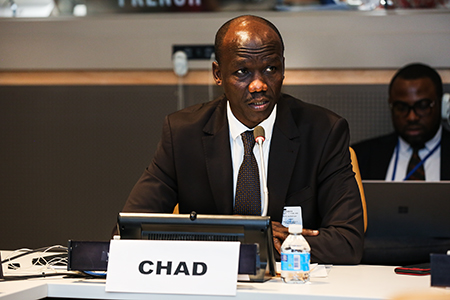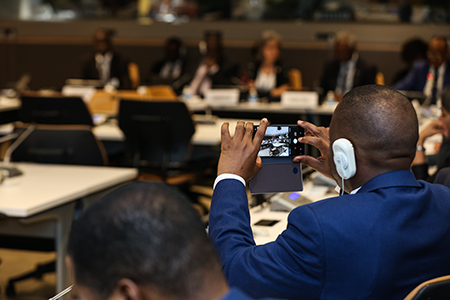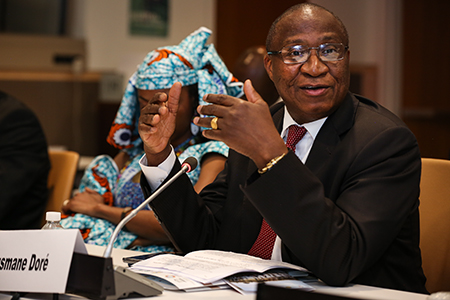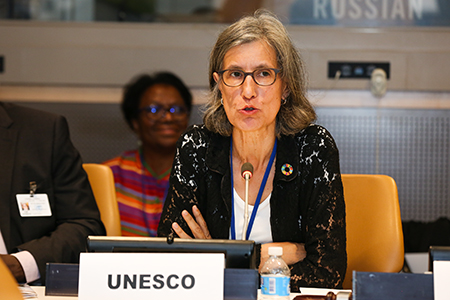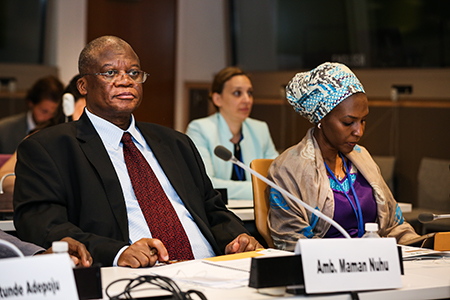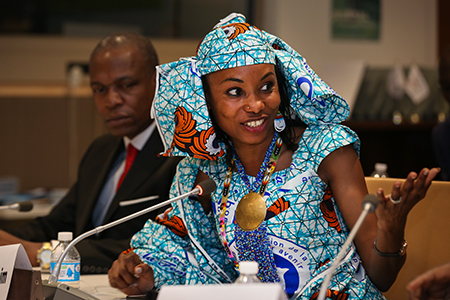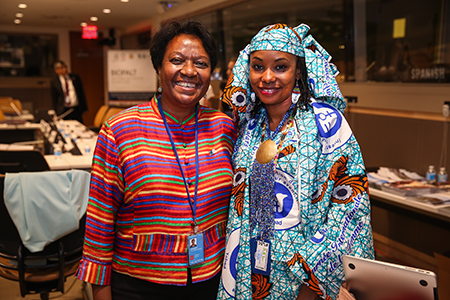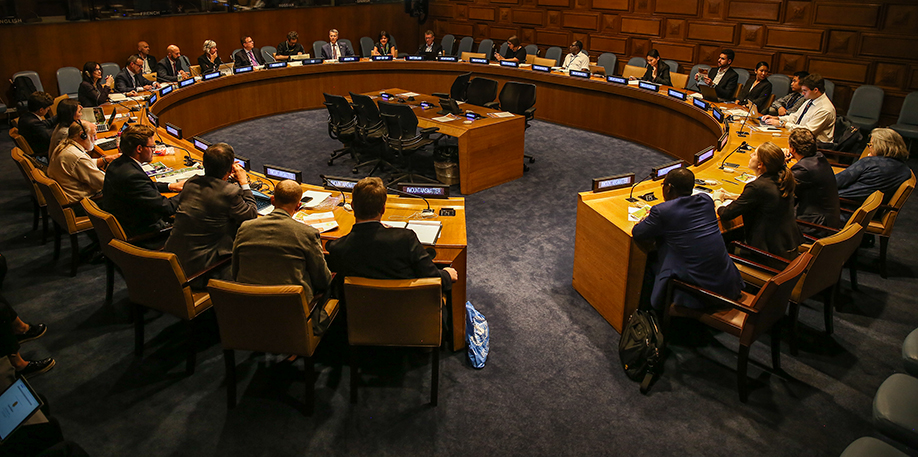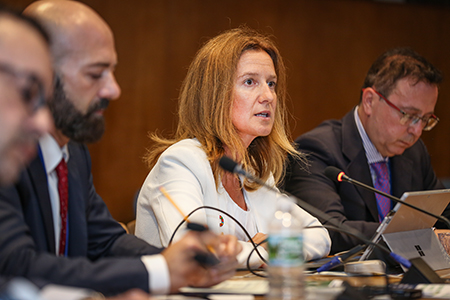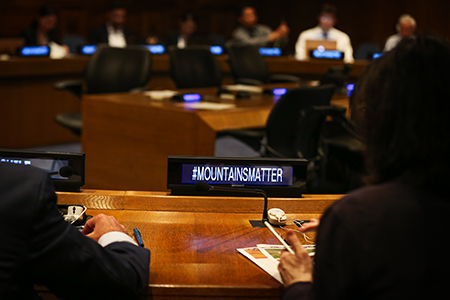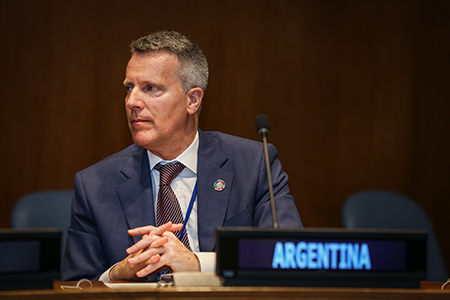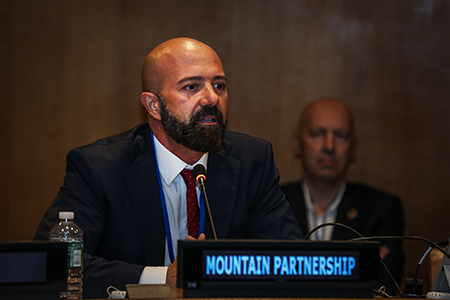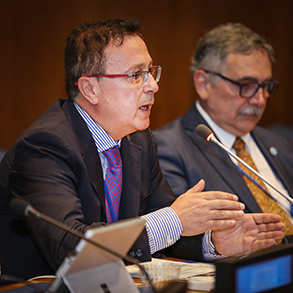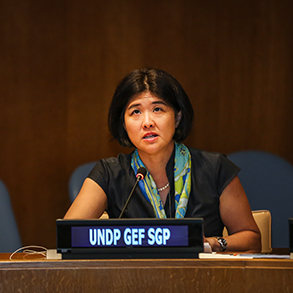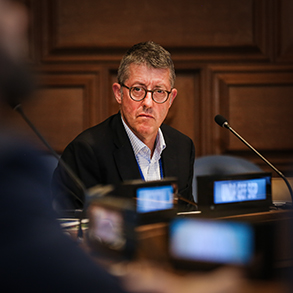Summary
The following events were covered by IISD Reporting Services on Monday, 16 July, 2018:
- Healthy Ecosystems for Sustainable Development: Engaging Governments and Civil Society towards the 2020 Biodiversity Milestones
- Making the SDGs Work for the Lake Chad Basin
- Leading Sustainable Mountain Development
Photos by IISD/ENB | Natalia Mroz
For photo reprint permissions, please follow instructions at our Attribution Regulations for Meeting Photo Usage Page
Healthy Ecosystems for Sustainable Development: Engaging Governments and Civil Society towards the 2020 Biodiversity Milestones Presented by International Union for Conservation of Nature (IUCN), Wildlife Conservation Society (WCS), Government of France, and the Convention for Biological Diversity (CBD) Secretariat
Moderated by David O’Connor, IUCN, this event focused on the importance of biodiversity conservation and healthy ecosystems to human livelihoods and well-being, and addressed ways forward to: integrate or align the Aichi targets with the 2030 Agenda for Sustainable development (2030 Agenda); form a coalition among stakeholders to enhance actions to reduce biodiversity loss; and mobilize funding for nature conservation.
During opening remarks, Cyrie Sendashonga, IUCN, asked how we can accelerate momentum to achieve the 2020 biodiversity milestones.
John Robinson, WCS, said the 2030 Agenda recognized that sustainable development and biodiversity conservation are inextricably linked, and neither can succeed without progress on the other. He noted that many lands under protection are not in the right places or lack effective management, and that one-third of the world’s lands are highly degraded.
Brune Poirson, Minister, Ecological and Inclusive Transition, France, outlined her country’s ambitions for conservation of biodiversity, domestically and internationally, highlighting the need for: concrete action at the national level; voluntary commitments from the private sector; and a knowledgeable and engaged citizenry. She said the 2020 CBD Conference of Parties in Beijing would be an opportunity to assess the need for changes to national commitments and that we have an historic opportunity to slow degradation of biodiversity by acting together.
Cristiana Pasça Palmer, CBD Executive Secretary, highlighted the need for: urgent, inclusive, and transformative actions on biodiversity to achieve the 2030 Agenda. Stressing that business-as-usual will generate negative impacts on human well-being, she called for: a systemic approach; raising awareness in the media; and uplifting the momentum of CBD COP 10, up to 2020 and beyond. Palmer also stressed: mainstreaming biodiversity into non-environmental sectors; addressing consumer behavior; engageing all stakeholders, including marginalized and indigenous groups; and intensifying efforts to mobilize financing for biodiversity protection.
Offering perspectives from the national level, Kazuaki Hoshino, Kagoshima University and CBD COP 10 Acting President, Japan, recalled the concept of “living in harmony with nature” and stressed a bottom-up approach, noting Japan’s Satoyama Initiative as a model for promoting sustainable use of biodiversity in local production landscapes. He also called for internalizing the value of biodiversity conservation into economic activities, including through promoting sustainable consumption and production patterns, and implementing a biodiversity certification scheme.
Edda Fernández, Ministry of Environment and Natural Resources, Mexico, outlined her country’s efforts on biodiversity conservation, including: adopting and implementing the National Biodiversity Strategy; mainstreaming the biodiversity agenda into the economy, including through agriculture, forestry, tourism, and health sectors; and introducing a circular economy approach as the best tool for engaging the business sector. She called for partnering with civil society organizations, including developing simple language on biodiversity to communicate with the financial and economic sectors.
During the panel on engagement with civil society and scientists, Cyrie Sendashonga, IUCN, described IUCN’s work with governments, NGOs, scientists, and indigenous peoples, highlighting: generation of knowledge to guide action; action on the ground; and the quadrennial World Conservation Congress, to convene in France in 2020.
John Robinson, WCS, described evidence suggesting a potential “decoupling” of biodiversity loss from other indicators, noting that, between 1993 and 2014, the human population grew by 23%, and the economy by 153%, but the biological impact of increased human pressure increased by only 9%. He identified urbanization as a possible explanation, due to more efficient energy consumption, and said work on biodiversity conservation may not be a “totally gloomy picture.”
Lin Li, WWF International, urged collective ambition and commitment so that, by 2020, declining trends related to biodiversity would be reversed. She highlighted: engagement at the top levels of countries, companies and households; and revisions of Aichi targets and related national targets in the post-2020 world.
Patricia Zurita, Birdlife International, said we have not made the biodiversity crisis clear, urgent or important enough for most people to understand, and called for going beyond traditional partnerships, noting the absence of ministers of finance at the event.
Chantal Marijnissen, European Commission, highlighted working with communities, such as its ‘Larger than Tigers’ program, noting that vulnerable people need to see the benefits of conservation. She also emphasized use of private sector financing, including through guarantees and loans on projects related to ecosystem services. Citing a need to increase visibility, she said CBD COP 15 could be the biodiversity equivalent of what Paris was for climate change.
Yasmine Fouad, Minister of Environment, Egypt, said challenges remain to achieve the Aichi targets by 2020 and the 2030 Agenda, including lack of business and financial sector participation; and implementation gaps among different sustainable development agendas. She highlighted that CBD COP 14 aims to address these challenges and to translate science into policies and actions on the ground, including through: involvement of all stakeholders by stressing “the cost of inaction”; building different levels of partnerships for creating innovation; and stock-taking of lessons to scale up and accelerate actions on biodiversity.
Brune Poirson, Minister, Ecological and Inclusive Transition, France, says being pessimistic is useless, we still have the power to reverse the trend of biodiversity loss
Yasmine Fouad, Minister of Environment, Egypt, called for greater recognition of the linkages between biodiversity and climate change
Cyrie Sendashonga, IUCN, highlighted IUCN’s work with 350 projects in 60 countries around the world
Cristiana Pasça Palmer, CBD Executive Secretary, said we need to shift from a linear to a systemic approach to implement the 2030 Agenda
Moderator David O’Connor, IUCN
Kazuaki Hoshino, Kagoshima University, said it is crucial to translate the concept of planetary boundary into local context
Lin Li, World Wildlife Fund – International, said no one organization, sector or country can solve the biodiversity challenge alone
Brune Poirson, Minister, Ecological and Inclusive Transition, France, and
Cyrie Sendashonga, IUCN
Edda Fernández, Ministry of Environment and Natural Resources, Mexico, said we need to encourage the private sector to use our knowledge on biodiversity
Patricia Zurita, Birdlife International, said birds are ambassadors for nature
John Robinson, WCS, said biodiversity as a concept is not appreciated to the extent necessary
Chantal Marijnissen, European Commission, highlighted a shift from “pure conservation” to working more with communities, especially in fragile regions
Participants capture the discussion
Yasmine Fouad, Minister of Environment, Egypt
Panelists confer after the session
Participants prepare for the side event
Cyrie Sendashonga poses with participants after the event
Contact:
- David O'Connor | David.OCONNOR@iucn.org
More Information:
Making the SDGs Work for the Lake Chad Basin
Presented by the UN Educational, Scientific and Cultural Organization (UNESCO) and the Permanent Missions of Nigeria, Niger, Chad, Cameroon and the Central African Republic to the UN, in collaboration with African Development Bank and Lake Chad Basin Commission
This side event highlighted the UNESCO Biosphere and Heritage of Lake Chad (BIOPALT) project as an example of multidisciplinary cooperation, linked to multiple Sustainable Development Goals (SDGs), and implemented in five countries to address the crisis in the Lake Chad area.
Flavia Schlegel, UNESCO, opened the event noting: increasing hardships experienced by those living in the Lake Chad Basin, and the 2017 UN Security Council recognition of security challenges in the region. She said the event offers a platform for governments, UN agencies, civil society and academia to reflect on the relevance of adopting a multisectoral and multidisciplinary response to solving the humanitarian and ecological crisis. She noted that BIOPALT is an ambitious project and that participation of five countries has proven its relevance for turning transboundary conflict into cooperation.
Moderator Ibrahim Thiaw, UN Secretary-General’s Special Advisor for the Sahel, said the changed lake is shrinking like an old skin, causing loss of livelihoods, and leading to despair on behalf of millions of young people. He called BIOPALT a wonderful natural resource planning and management tool that aims to address the deeper causes of the crisis. He underscored opportunities in the Sahel region, despite the challenges, including: the abundance of renewable energy resources; youth, who are increasingly educated and eager to work; and its culture.
Four country representatives shared perspectives on regional challenges and the value of BIOPALT. Suleiman Hussein Adamu, Minister, Federal Ministry of Water Resources, Nigeria, emphasized: devastating impacts on the socioeconomic wellbeing by the Boko Haram insurgency; the importance of development for promoting peace; and Nigeria’s commitment to the partnership.
Issa Dourbagne, Minister, Economy, Planning and Development, Chad, stressed the: importance of the area for its terrestrial and aquatic biodiversity; impacts on women and youth; opportunity for collaboration and synergy between different scientific centers created by BIOPALT; and, the will of the five countries to join together in response to the threat.
Abdallah Wafy, Permanent Representative of Niger to the UN, underscored links between the humanitarian crisis and development, and the need to promote the SDGs, saying it is necessary to address the hydrologic condition of the lake, conservation of natural resources, and the heritage of the region.
Zacharie Serge Raoul Nyanid, Permanent Mission of Cameroon, noted that a 90% reduction in rainfall has affected more than 40 million people. He congratulated the BIOPALT project for its sustainable development approach on management of the hydrological and cultural resources of the basin.
Maman Nuhu, Lake Chad Basin Commission, identified key project elements: management of water resources to ensure access to clean water and sanitation, including through restoring ponds and preserving oases; developing policy briefs as advocacy tools targeted at decisionmakers; action plans to support communities in monitoring and management of resources; and addressing the plight of women and youth to fight the Boko Haram insurgency.
Hindou Oumarou Ibrahim, M’Bororo Indigenous Women and People Association of Chad, said any solution to the Lake Chad crisis must include engagement of women, who know the resources, needs, and priorities for survival of the community and their children. She highlighted the need to carry the project forward so the people will not remain dependent on humanitarian aid, but be in charge of own livelihoods.
Ousmane Doré, Director-General, African Development Bank, attributed the success of the BIOPALT project to: a focus on socioeconomic development; UNESCO’s multi-disciplinary approach, with cultural expertise complementing on-the-ground work; changing behavior by ensuring ownership, from project design through implementation; and an understanding among the countries that success of the project required contributing to the common pool.
Adeshola Olatunde Adepoju, Forestry Research Institute of Nigeria, and African Network of Man and the Biosphere Programme, emphasized the project’s scientific and economic prongs, including biodiversity restoration and the green economy approach using cultural enterprises that reduce pressure on biodiversity resources. He described a transboundary reforestation project as a unique example of five African countries coming together in peace and collaboration.
During ensuing discussion, panelists addressed: cultural issues; causes of the lake’s shrinkage; gender issues; and high rates of child marriage, with panelists noting the importance of mainstreaming gender and the need to understand and address root causes of poverty and education.
In closing remarks, moderator Thiaw highlighted stories of deprivation and degradation, but also hope, and Ernesto Ottone Ramírez, UNESCO, said BIOPALT is not only a personal struggle in an important part of the world, but also represents the possibility that communities, governments and the international community can come together to build a future for everybody.
Traditional dress and logo for M’Bororo Indigenous Women and People Association of Chad
Information on the BIOPALT project
L-R: Suleiman Hussein Adamu, Minister, Federal Ministry of Water Resources, Nigeria and Flavia Schlegel, UNESCO
Ibrahim Thiaw, UN Secretary-General Special Advisor for the Sahel, said the UN Support Plan for the Sahel facilitates: cross-boundary cooperation; conflict prevention; inclusive and equitable growth; climate change responses; access to renewable energy; and empowerment of women and youth
Abdallah Wafy, Permanent Representative of Niger to the UN, emphasized promoting the three pillars of the SDGs as key to turning the page for the Lake Chad area
Issa Dourbagne, Minister, Economy, Planning and Development, Chad, said damages to the region are changing the society for the millennial culture
Capturing the moment
Zacharie Serge Raoul Nyanid, Permanent Mission of Cameroon to the UN, said the UN Food and Agriculture’s 2017-2019 response strategy (to ensure food security of conflict-affected communities) will contribute to lessening the impact of the crisis
Ousmane Dore, African Development Bank, said a paradigm shift is needed to change cultural norms about how to manage resources
Flavia Schlegel, UNESCO, said the people of the Lake Chad basin once traveled hours to fetch water, but now cannot find it; girls once could not attend school, now are held as hostages by terrorists
Maman Nuhu, Lake Chad Basin Commission, said the only lasting solution to the crisis is one that empowers the people to take control of the means of livelihood in the ways they know best
Hindou Oumarou Ibrahim, M’Bororo Indigenous Women and People Association of Chad, urged ministers, ambassadors and other partners to carry this project forward and give the people hope
Noeline Raondry Rakotoarisoa, UNESCO and Hindou Oumarou Ibrahim, M’Bororo Indigenous Women and People Association of Chad
Ibrahim Thiaw greets participants
Contacts:
- Noeline Raondry Rakotoarisoa
| n.raondry-rakotoarisoa@unesco.org
More Information:
Leading Sustainable Mountain Development Presented by the Government of Andorra, in partnership with the Mountain Partnership, UN Food and Agriculture Organization (FAO), UN Development Programme (UNDP), and the Governments of Argentina, Chile, Italy and Switzerland
This side event convened to advocate for pro-mountain policies and actions to increase the visibility of mountain issues in the international and national processes for implementing the 2030 Agenda on Sustainable Development (2030 Agenda).
Moderator Grammenos Mastrojeni, Ministry of Foreign Affairs, Italy, and Chair, the Mountain Partnership Steering Committee, said mountains cover 22% of the earth's land surface, are home to 13% of the world’s population, and provide 60-80% of the world's fresh water, but no one talks about them in international processes. He stressed the Sustainable Development Goals (SDGs) cannot be achieved without increased attention to sustainable mountain development.
Silvia Calvó Armengol, Minister, Environment, Agriculture and Sustainability, Andorra, emphasized that mountains contribute to the welfare of her people and highlighted her country’s VNR and efforts to implement the SDGs, in particular SDG 6 (clean water and sanitation) and SDG 15 (life on land). Regarding areas requiring action, she highlighted: introducing legislation on biodiversity and ecosystems; a target of 75% renewable energy by 2050; and pursuing energy efficiency and savings in the construction and building sectors. She called for better visibility of mountains in implementing the 2030 Agenda and said Andorra continues its leadership on sustainable mountains development.
René Castro, Assistant Director General, FAO, said mountain ecosystems provide vital resources including water, energy, biodiversity and food, but they are extremely vulnerable to climate change, which alters water regimes and intensifies natural disasters. He called for integrating sustainable mountain development into the 2030 Agenda to avoid jeopardizing food security and economic development of mountain peoples and downstream communities, including displacement of local communities.
Alejandro Verdier, Deputy Permanent Representative of Argentina to the UN, noted that 85 million people live in the mountains of Latin America, and stressed his country’s efforts to: strengthen regional and national mountain initiatives; develop action plans; and implement concrete mountain policies. He underscored the need to: consider innovative ways to embed mountains in regional policies; and continue fostering and strengthening the Mountain Partnership.
Jorge Iglesias, Deputy Permanent Representative of Chile to the UN, said his country has approximately 64% of mountain areas, which provide 60-80% of fresh water to domestic agriculture and industrial consumption. He stressed that natural resources have been threatened by the impacts of climate change and outlined a national policy on sustainable mountain development implemented through collaboration with the private sector and civil society organizations (CSOs). He noted the importance of the Mountain Partnership’s leadership on advocating for the importance of mountains in the 2030 Agenda.
Christoph Lang, Swiss Agency for Development and Cooperation, Switzerland, highlighted his country’s efforts to develop and implement policies and guidelines for rural and mountain areas through multi-stakeholder partnerships. Noting the absence of a strong voice for mountains at the global level, he stressed the Mountain Partnership Framework of Action as an essential tool for sharing experiences among and beyond mountain areas and increasing visibility globally.
Giorgio Grussu, Mountain Partnership Secretariat, FAO, said the Mountain Partnership serves as the “custodian agency” of SDG 15. 4, known as the Mountain Green Cover Index, which measures changes of green vegetation in mountain areas of 157 countries. He said challenges remain in collecting accurate data, especially across borders, and emphasized the need for regional and international support in securing data availability and accuracy.
Yoko Watanabe, UNDP Global Environment Facility (GEF) Small Grant Programme (SGP), noted that the Mountain Partnership is a platform to bring mountain communities’ voices to discussion on the SDGs. She outlined the GEF SGP’s projects on sustainable mountains and highlighted challenges, including: lack of access to investment and technologies for sustainable energy, farming, and water management; weak environmental enforcement by national institutions; and lack of recognition on traditional knowledge. She called for increasing dialogue between mountain communities and governments: and ensuring targeted support for mountain communities to enable effective interventions.
In ensuing discussion, topics included: the importance of working with CSOs to bring more mountain communities together; integrating mountain biodiversity issues into international processes, such as a process on the reducing emissions from deforestation and forest degradation; and the need to collectively raise awareness on “why mountains matter.”
The room during the discussion
Silvia Calvó Armengol, Minister, Environment, Agriculture and Sustainability, Andorra
#mountainsmatter, the hashtag for the Mountain Partnership
René Castro, Assistant Director General, FAO
Alejandro Verdier, Deputy Permanent Representative of Argentina to the UN
Participants confer during the session
Giorgio Grussu, FAO
Grammenos Mastrojeni, Ministry of Foreign Affairs, Italy
Yoko Watanabe, UNDP GEF SGP
Christoph Lang, Swiss Agency for Development and Cooperation
Contact:
- Sara Manuelli
| Sara.Manuelli@fao.org
